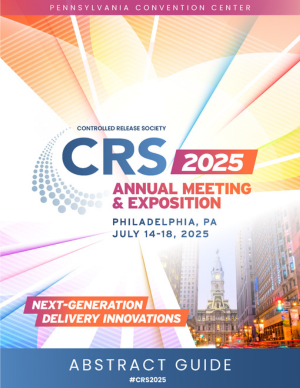Gene Delivery and Gene Editing
Tech Session III: Gene Delivery and Gene Editing II
The lipid nanoparticle shape and morphology affect the efficiency and duration of mRNA transfection
Wednesday, July 16, 2025
11:16 AM - 11:27 AM EDT
Location: 119 A
Introduction:
Lipid nanoparticles (LNP) are promising nucleic acid carriers with potential for treating various diseases (1). However, their rapid clearance, high liver accumulation, and poor transfection efficacy often hinder their effectiveness and applicability. It has been hypothesized that LNP morphology can be optimized to improve transfection efficiency, reduce liver uptake, and enhance circulation half-life (2,3). This study aims to systematically investigate how the LNP shape impacts mRNA transfection efficacy, towards a more rational design of LNP-based drug products.
Learning Objectives:
At the completion of this activity, participants will know
- Describe how LNP shape influences transfection efficacy.
- Ellipsoidal-vesicular LNP improve mRNA transfection in comparison to spherical LNP.
- Demonstrate the potential of optimized LNPs for improved gene delivery systems.
Joseph Brealey – Researcher, NanoFCM Co., Ltd, Nottingham, UK.; Martin Dulle – Post doc, Jülich Centre for Neutron Science (JCNS-1/IBI-8), Forschungszentrum Jülich, Germany.; Thomas Hammoor – PhD student, DWI – Leibniz-Institute for Interactive Materials, RWTH Aachen University, Germany.; Josbert Metselaar – PI, Institute for Experimental Molecular Imaging, RWTH Aachen University Hospital, Germany.; Ben Peacock – Researcher, NanoFCM Co., Ltd, Nottingham, UK.; Saba Shahzad – Post doc, Ernst Ruska-Centre for Microscopy and Spectroscopy with Electrons (ER-C-3): Structural Biology, Forschungszentrum Jülich, Germany.; Alexandros Sofias – PI, Institute for Experimental Molecular Imaging, RWTH Aachen University Hospital, Germany.; Mark Weiler – TA, Institute for Experimental Molecular Imaging, RWTH Aachen University Hospital, Germany.

Sara Elsafy, MSc (she/her/hers)
PhD student
RWTH Aachen University
Aachen, Nordrhein-Westfalen, Germany

